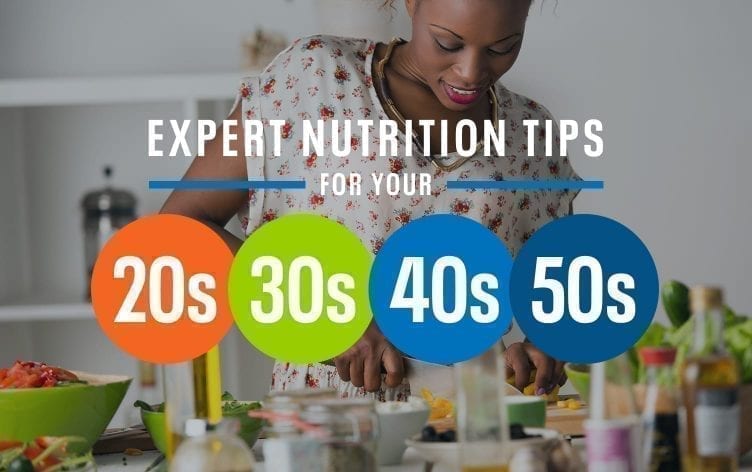Our bodies changeas we age, so ourfitnessandnutritional habitsshould adapt, too. At a younger age, the body naturally holds on to morelean muscle mass, which supports astrong metabolism. It’s also the perfect time tocreate healthy eating habitsyou can carry with you long term. Later in life, the focus shifts towardmaintaining consistencyand preventing muscle mass loss.

A lot of our experiences in our 20s related to food, nutrition and body image can deeply impact health and well-being for decades to come. For example, instead offocusing on specific foods as good or bad, now is the time toput them all on a neutral playing field. If you’re struggling withdisordered eating, make it a priority to seek help from aregistered dietitian, therapist or other healthcare professional. Doing the hard work tocreate a positive relationship with foodearly on can free years of life without constant thoughts of food and body dissatisfaction.
It’s also important to develop healthy habits to take with you into the next decades. Here are a few suggestions:
- Learn to cook:Perhaps you’re living on your own for the first time, and relying too heavily ontakeoutor packaged convenience foods that are often lower in vegetables andhigher in sodium,saturated fat, preservatives andrefined carbohydrates. Over time, this can negatively affect health. Learning somecooking basics, either by taking classes, doing some YouTube investigating, orcookbook readinghelpsdiversify the dietandmake it fun, too.
- Experiment outside your comfort zone:Now is the time totry new foodsandcuisines, which can be more challenging as we age and become more set in our ways. Try new-to-you vegetables likeBrussels sprouts,squash, collard greens, radishes orwhole grainslike quinoa or farro or teff. Play around withdifferent cooking methods, like roasting, baking or sauteeing, to make certain veggies more palatable and delicious.

Whether you’re starting or growing a family, advancing in your career, or both, this is the decade when it seems there are never enough hours in the day, andself-care(including proper nutrition) can fall by the wayside. Check-in with yourself regularly to make sure you’re prioritizing the following:
- Regular meals:Hectic schedules can make it easy to skip meals or grab something unsatisfying on-the-go. This can lead toblood sugar crashes,feeling ‘hangry’and eventuallyovereatingorbingeing— andthe cycle often repeats itself. Aim to eat a well-balanced meal that includesprotein,fiber, carbohydrates andhealthy fatevery 3-4 hours. This may take some planning ormeal preppingon the weekends, but it’s worth it.
- Stress management:Taking care of your mental healthmakes you a better employee, boss, mom, dad, partner, friend, etc. Whateverstress-management toolswork best for you — like journaling, therapy, exercise, meditation — make time for them on a regular basis.
- Vegetables:We can all benefit fromadding more veggies to our meals;researchshows plant-based diets can decrease the risk of both heart disease and cancer. Otherresearchalso showsplant-based eatingmay help prevent and manage Type 2 diabetes, which is on the rise. For women who are trying to become pregnant (or are pregnant), vegetables likebroccoli,leafy greensandBrussels sproutsare good sources of folate, which is key for a baby’s growth and development.

Starting in your late 30s and early 40s, when the body’s bone mass peaks, women slowly start to lose calcium from their bones. This, combined with the reduction of estrogen that starts with perimenopause, increases risk for osteopenia and osteoporosis. Women in this age category should consider taking a vitamin D supplement becausevitamin D is in so few foods, and consume plenty of bone-building calcium. Good sources include:
- Cheese
- Yogurt
- Canned salmon or sardines (due to the edible bones)
- Beans and lentils
- Chia and sesame seeds
- Dark leafy greens like kale and collard greens
- Cow’s milk and fortified plant milks
- Soy foods like edamame and tofu
Menopause can be challenging for women because it often comes withchanges to body composition. When estrogen is reduced, weight gain in the stomach area is common. This can be uncomfortable, and many women have the urge to diet and restrict food intake to combat these changes. However, weight gain during menopause is a natural protective mechanism and completely normal. Thebody fights against dietary restriction和减肥企图大调的每一步的方式ing this time, which can also have negative effects on metabolism. Rather,nourishing the body with a variety of foodsand engaging in activities thathelp women feel good in their current bodiesis the best approach. This could be throughvarious forms of exercise,meditationand journaling.

Welose muscle mass as we age, and this notably increases after age 50. Loss of muscle mass over time can result in reduced ability to perform everyday activities like walking, cleaning, yard work and errands, as well as exercise. The good news isconsuming adequate proteinsources, in addition to staying physically active, can help maintain muscle mass.Resistance traininglikeyoga,Pilatesandweightliftingis also especially helpful. Focus on including a quality protein source with each meal and snack such as:
- Chicken or turkey
- Fish
- Tofu or tempeh
- Greek yogurt
- Eggs
- Nuts and seeds
- Beans
- Cottage cheese
- Lean red meat (occasionally)
Make progress every day while you work on mini fitness and nutrition goals, like walking more steps or learning to track macros. Go to “Plans” in the MyFitnessPal app for daily coaching and easy-to-follow tasks to keep you motivated.

